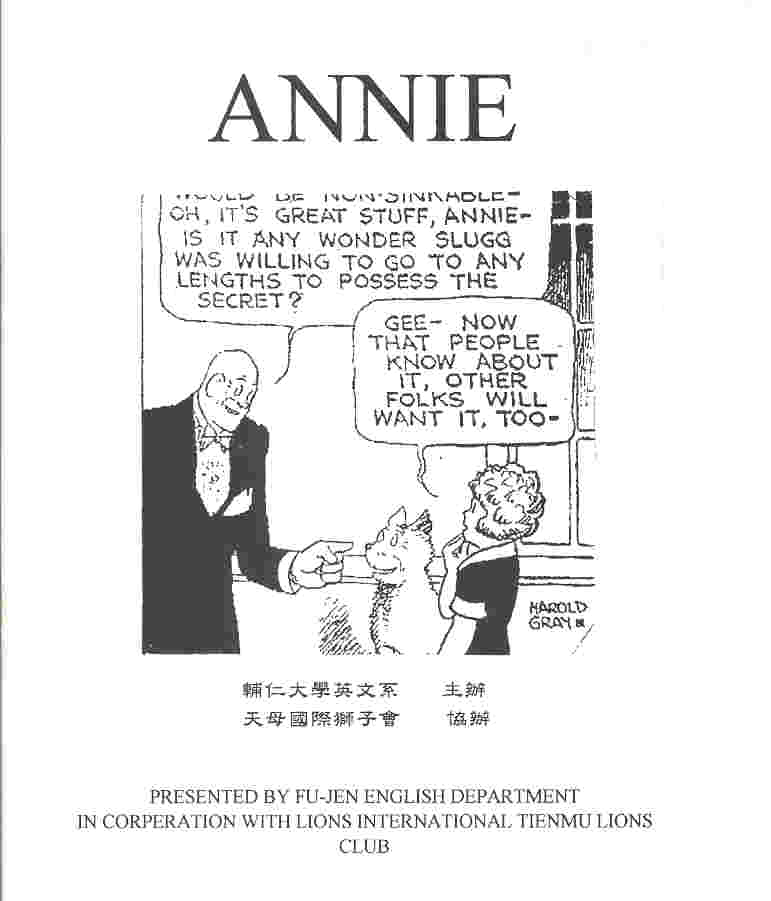 |
Annie,
who does't even know her last name, is an eleven year old foundling.
Her parents left her on the steps of New York City's Municipal Orphanage
with only half of a silver locket and a note saying that they would
come back for her someday. It's a "Hard Knock" life for the orphants
because the Supervisor Miss Hannigan makes them clean and scrub for
a meal of cold mush every day. Nevertheless, Annie never loses
her faith that everything will be better "Tomorrow." Most of all,
she believes that her parents love her and that they will be back to
get her someday.
At Chritmas,
the secretary of the bilionair Oliver Warbucks, Miss Grace Farrell visits
the orphanage to invite an orphant to Mr. Warbucks' home for the holiday.
Annie wins the chance and wins the hearts of everyone she meets including
the President of the United States, Franklin Delano Roosevelt.
Even the 1930s Great Depression doesn't defeat her optimism, Annie advises
Americans to hold onto their dreams.
When
Mr. Warbucks realizes that he needs someone to care for, and decides
to adopt Annie, the truth about Annie's parents is revealed. Over
nationwide radio program "Hour of "Smiles," Warbucks offers $50.000.00
reward to anyone who can prove they are Annie's mother and father.
Attraced by the reward, Miss hannigan and her shyster brother Rooster
and his girlfriend Lily scheme to get the money for themselves and make
it to "Easy Street." Claiming to be Mr. and Mrs. Mudge, they show
up at the Warbucks Mansion with false papers and a fake matching half
of the silver locket. The FBI foils their plan by finding out
the truth that Annie's parents died many years ago. On Chrismas
day, Mr. Warbucks becomes Daddy Warbucks and for Annie and everyone
there's "A New Deal for Christmas."
|
|
|
Director's
note
This
year's senior play ANNIE is a perfect musical for the Christmas season:
ANNIE is based on the 1930s Chicago Tribune-New York Daily News Syndicate
Newspaper comic strip "Little Orphan Annie" By cartoonist Harold Gray.
Gray was a carttonist in touch with the conditions of American during
the Great Depression when every fourth person in America was out of
a job. He regularly toured the country and talked to people about
their views on America. He saw the soup kitchens and "hoovervilles"
at the edges of town- squalid camps of the unemployed. And Gray
put this knowledge to work in his comic strip. His characters
preached a gospel that Gray knew many of his readers wanted to hear:
They needed to know that the old values of self-reliance and hard work
had not been bankrupted by the economic catastrophes of the time.
Gray produced his tantalizing story about a little eleven-year old orphan
named "just Annie" for over 40 yearsl. The events in his strip
matched the events in the lives of Americans outside the strip- like
a diary.
Optimism
is needed today as much as it was sixty years ago and Annie's theme
"the sun's come out tomorrow," expresses our hope on the eve of the
New Year.
Thank
you seniors, actors, singers and dancers for your wonderful work and
spirit to produce this play.
This
Musical ANNIE is written by Thomas Meehan with music by Charles Strouse
and Lyrics by Martin Charnin. The English Department is prodicing
ANNIE by special permission from International Musical Incorporated,
Tokyo.
Lyn
Scott
|